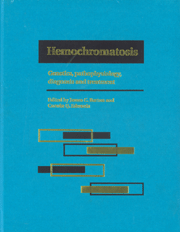Book contents
- Frontmatter
- Contents
- List of contributors
- Foreword
- Part I Introduction to hemochromatosis
- Part II Genetics of hemochromatosis
- Part III Metal absorption and metabolism in hemochromatosis
- Part IV Diagnostic techniques for iron overload
- Part V Complications of iron overload
- Part VI Therapy of hemochromatosis and iron overload
- Part VII Infections and immunity in hemochromatosis
- 35 Role of iron in infections and immunity
- 36 Bacterial infections in hemochromatosis
- 37 Chronic viral hepatitis and hemochromatosis
- 38 T-lymphocyte expression and function in hemochromatosis
- Part VIII Hemochromatosis heterozygotes
- Part IX Relationship of hemochromatosis to other disorders
- Part X Animal models of hemochromatosis and iron overload
- Part XI Screening for hemochromatosis
- Part XII Hemochromatosis: societal and ethical issues
- Part XIII Final issues
- Index
37 - Chronic viral hepatitis and hemochromatosis
from Part VII - Infections and immunity in hemochromatosis
Published online by Cambridge University Press: 05 August 2011
- Frontmatter
- Contents
- List of contributors
- Foreword
- Part I Introduction to hemochromatosis
- Part II Genetics of hemochromatosis
- Part III Metal absorption and metabolism in hemochromatosis
- Part IV Diagnostic techniques for iron overload
- Part V Complications of iron overload
- Part VI Therapy of hemochromatosis and iron overload
- Part VII Infections and immunity in hemochromatosis
- 35 Role of iron in infections and immunity
- 36 Bacterial infections in hemochromatosis
- 37 Chronic viral hepatitis and hemochromatosis
- 38 T-lymphocyte expression and function in hemochromatosis
- Part VIII Hemochromatosis heterozygotes
- Part IX Relationship of hemochromatosis to other disorders
- Part X Animal models of hemochromatosis and iron overload
- Part XI Screening for hemochromatosis
- Part XII Hemochromatosis: societal and ethical issues
- Part XIII Final issues
- Index
Summary
Introduction
The liver synthesizes transferrin and ferritin, and is the major tissue storage site of iron. Consequently, iron metabolism may be altered in chronic hepatitis. Stored ferritin may be released into the circulation due to lysis of damaged hepatocytes, leading to elevated serum ferritin concentrations. Transferrin receptor expression by hepatocytes may be up-regulated as a consequence of chronic inflammation, and lead to increased iron absorption and hepatic iron. Chronic viral hepatitis may up-regulate hepatic production of transferrin receptor or ferritin directly and effect increased hepatic iron deposition. Thus, chronic inflammatory processes in the liver such as viral hepatitis may cause increased plasma and hepatic iron concentrations by a variety of mechanisms. Ferrous iron promotes free radical formation and lipid peroxidation that mediates acute and chronic tissue damage. Because iron status influences the immune response, primary iron overload disorders and hepatic iron overload have been linked to an increased risk of bacterial infections due to Vibrio, Neisseria, and Yersinia. Iron may act as a substrate for viral replication, and therefore patients with chronic viral hepatitis and iron overload may have increased viral replication. The iron-binding proteins lactoferrin and transferrin play an important role in the immune response to infection. Although the effect of lactoferrin on hepatitis C virus replication is unknown, lactoferrin inhibits replication of herpes simplex virus, cytomegalovirus, and human immunodeficiency virus in vitro. Therefore, iron status in patients with chronic viral hepatitis may be important clinically due to its effects on hepatic inflammation and viral replication, and reducing iron stores may decrease hepatic injury in patients with chronic hepatitis.
- Type
- Chapter
- Information
- HemochromatosisGenetics, Pathophysiology, Diagnosis and Treatment, pp. 387 - 395Publisher: Cambridge University PressPrint publication year: 2000
- 1
- Cited by



